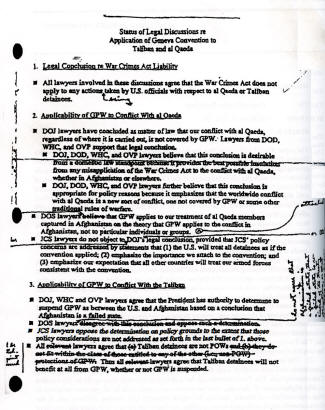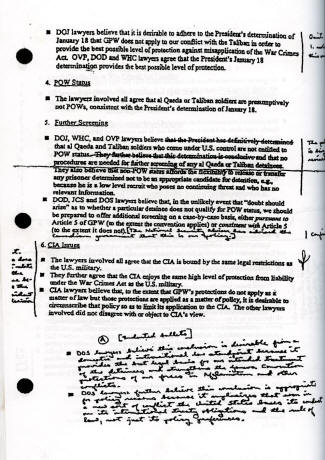|
MEMO 10
THE LEGAL ADVISER
DEPARTMENT OF STATE
WASHINGTON
February 2, 2002
MEMORANDUM
TO: Counsel to
the President
FROM: William
H. Taft, IV
SUBJECT:
Comments on Your Paper on the Geneva Convention


The paper should
make clear that the issue for decision by the President is whether the
Geneva Conventions apply to the conflict in Afghanistan in which U.S.
armed forces are engaged. The President should know that a decision
that the Conventions do apply is consistent with the plain language of
the Conventions and the unvaried practice of the United States in
introducing its forces into conflict over fifty years. It is consistent
with the advice of DOS lawyers and, as far as is known, the position of
every other party to the Conventions. It is consistent with UN Security
Council Resolution 1193 affirming that "All parties to the conflict (in
Afghanistan) are bound to comply with their obligations under
international humanitarian law and in particular the Geneva Conventions.
..." It is not inconsistent with the DOJ opinion that the
Conventions generally do not apply to our world-wide effort to combat
terrorism and to bring al Qaeda members to justice.
From a policy
standpoint, a decision that the Conventions apply provides the best
legal basis for treating the al Qaeda and Taliban detainees in the way
we intend to treat them. It demonstrates that the United States bases
its conduct not just on its policy preferences but on its international
legal obligations. Agreement by all lawyers that the War Crimes Act does
not apply to our conduct means that the risk of prosecution under that
statute is negligible. Any small benefit from reducing it further
will be purchased at the expense of the men and women in our armed
forces that we send into combat. A decision that the Conventions do not
apply to the conflict in Afghanistan in which our armed forces are
engaged deprives our troops there of any claim to the protection of the
Convention in the event they are captured and weakens the protections
accorded by the Conventions to our troops in future conflicts.
The structure of
the paper suggesting a distinction between our conflict with al Qaeda
and our conflict with the Taliban does not conform to the structure of
the Conventions. The Conventions call for a decision whether they apply
to the conflict in Afghanistan. If they do, their provisions are
applicable to all persons involved in that conflict -- al Qaeda,
Taliban, Northern Alliance, U.S. troops, civilians, etc. If the
Conventions do not apply to the conflict, no one involved in it will
enjoy the benefit of their protections as a matter of law.
Status of Legal
Discussions re
Application of Geneva Convention to
Taliban and al Qaeda
1. Legal
Conclusion re War Crimes Act Liability
2. Applicability
of GPW to Conflict With al Qaeda
-
DOJ lawyers have
concluded as matter of law that our conflict with al Qaeda,
regardless of where it is carried out, is not covered by GPW.
Lawyers from DOD, WHC, and OVP support that legal conclusion.
-
DOJ, DOD,
WHC, and OVP lawyers believe that this conclusion is desirable
from a domestic law standpoint because it provides the best
possible insulation from any misapplication of the War Crimes
Act to the conflict with al Qaeda, whether in Afghanistan or
elsewhere.
-
DOJ, DOD,
WHC, and OVP lawyers further believe that this conclusion is
appropriate for policy reasons because it emphasizes that the
worldwide conflict with al Qaeda is a new sort of conflict, one
not covered by GPW or some other traditional rules of warfare.
-
DOS lawyers
believe that GPW applies to our treatment of al Qaeda members
captured in Afghanistan on the theory that GPW applies to the
conflict in Afghanistan, not to particular individuals or groups.
-
DOS lawyers
believe this conclusion is desirable from a domestic and
international law standpoint because it provides the best legal
basis for our intended treatment of the detainees and
strengthens the Geneva Convention protections of our forces in
Afghanistan and other conflicts. DOS lawyers further believe
this conclusion is appropriate for policy reasons because it
emphasizes that even in a new sort of conflict the United States
bases its conduct on its international treaty obligations and
the rule of law, not just on its policy preferences.
-
JCS lawyers do
not object to DOJ's (or DOS's) legal conclusion, provided that JCS'
policy concerns are addressed by statements that (1) the U.S. will
treat all detainees as if the convention applied; (2) emphasize the
importance we attach to theconvention; and (3) emphasize our
expectation that all other countries will treat our armed forces
consistent with the convention.
3. Applicability
of GPW to Conflict With the Taliban
-
DOJ, WHC and OVP
lawyers agree that the President has authority to determine to
suspend GPW as between the U.S. and Afghanistan based on a
conclusion that Afghanistan is a failed state.
-
DOS lawyers
disagree with this conclusion and oppose such a
determination
-
DOS lawyers do
not agree that Afghanistan is failed State, that a failed State is
relieved of its treaty obligations, or that the ***************
-
JCS lawyers
oppose the determination on policy grounds to the extent that those
policy considerations are not addressed as set forth in the last
bullet of 1. above.
-
All lawyers
agree that (a) Taliban detainees are not POWs
and (b) they do not fit within the class of those entitled
to any of the other (i.e. non-Pow) protections of GPW.
Thus all relevant lawyers agree that Taliban detainees will
not benefit at all from GPW, whether or not GPW is suspended.
-
DOJ lawyers
believe that it is desirable to adhere to the President's
determination of January 18 that GPW does not apply to our conflict
with the Taliban in order to provide the best possible level of
protection against misapplication of the War Crimes Act. OVP, DOD
and WHC lawyers agree that the President's January 18 determination
provides the best possible level of protection.
4. POW Status
5. Further
Screening
-
DOJ, WHC, and
OVP lawyers believe that the President has definitively
determined that al Qaeda and Taliban soldiers who come
under U.S. control are not entitled to POW status. They
further believe that this determination is conclusive and
that no procedures are needed for further screening of any al Qaeda
or Taliban detainees. They also believe that non-POW status affords
the flexibility to release or transfer any prisoner determined not
to be an appropriate candidate for detention, e.g., because he is a
low-level recruit who poses no continuing threat and who has no
relevant information.
-
DOD, JCS and DOS
lawyers believe that, in the unlikely event that "doubt should
arise" as to whether a particular detainee does not qualify for POW
status, we should be prepared to offer additional screening on a
case-by-case basis, either pursuant to Article 5 of GPW (to the
extent the Convention applies) or consistent with Article 5 (to the
extent it does not). The National Security Advisor has advised the
Canadian government that this is our policy.
6. CIA Issues
-
The lawyers
involved all agree that the CIA is bound by the same legal
restrictions as the U.S. military
-
They further
agree that the CIA enjoys the same high level of protection from
liability under the War Crimes Act as the U.S. military
-
CIA lawyers
believe that, to the extent that GPW's protections do not apply as a
matter of law but those protections are applied as a matter of
policy, it is desirable to circumscribe that policy so as to limit
its application to the CIA. The other lawyers involved did not
disagree with or object to CIA's view.
Go to Next Page |

